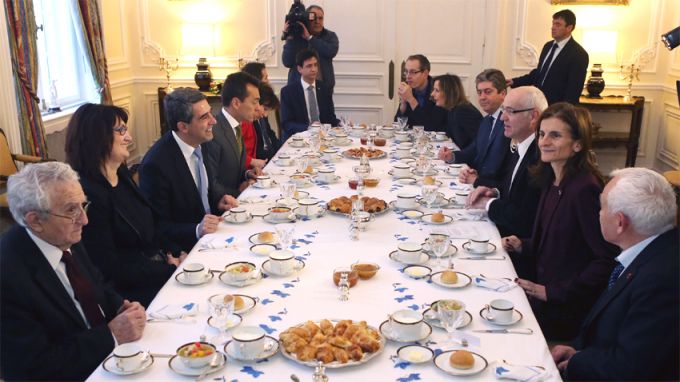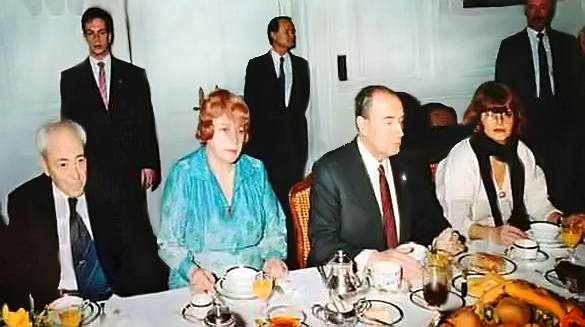
 Twenty-five years ago, French President Francois Mitterrand paid a visit to Bulgaria. Apart from meeting the then-head of state and communist leader Todor Zhivkov, he met with scholars from the Bulgarian Academy of Sciences, with professors and students from Sofia University and went to visit the French Language School in the capital. In the meantime, a breakfast was organized for him at the French Embassy, with twelve leading Bulgarian brainworkers and dissidents including the future first democratic president of Bulgaria, Zhelyu Zhelev. This working breakfast with Mitterrand has remained in Bulgaria’s recent history as a symbolic moment that preceded democratic changes. The developments in 1989 have transformed Bulgaria that embarked on the road of difficult but imminent political and economic reform. A quarter of a century later three Bulgarian presidents, Zhelyu Zhelev, Georgi Parvanov and Rosen Plevneliev, joined a breakfast at the French Embassy in Sofia to mark the anniversary of the emblematic Mitterrand visit. The group was joined by French Minister for European Affairs Thierry Repentin. Meantime, three round tables were held at Sofia University exploring the end of transition, European integration and the rise of civil society. In the view of Prof. Ivan Ilchev, Rector of Bulgaria’s oldest university, it was not by accident that, 25 years ago, Mitterrand chose to pay a visit to it:
Twenty-five years ago, French President Francois Mitterrand paid a visit to Bulgaria. Apart from meeting the then-head of state and communist leader Todor Zhivkov, he met with scholars from the Bulgarian Academy of Sciences, with professors and students from Sofia University and went to visit the French Language School in the capital. In the meantime, a breakfast was organized for him at the French Embassy, with twelve leading Bulgarian brainworkers and dissidents including the future first democratic president of Bulgaria, Zhelyu Zhelev. This working breakfast with Mitterrand has remained in Bulgaria’s recent history as a symbolic moment that preceded democratic changes. The developments in 1989 have transformed Bulgaria that embarked on the road of difficult but imminent political and economic reform. A quarter of a century later three Bulgarian presidents, Zhelyu Zhelev, Georgi Parvanov and Rosen Plevneliev, joined a breakfast at the French Embassy in Sofia to mark the anniversary of the emblematic Mitterrand visit. The group was joined by French Minister for European Affairs Thierry Repentin. Meantime, three round tables were held at Sofia University exploring the end of transition, European integration and the rise of civil society. In the view of Prof. Ivan Ilchev, Rector of Bulgaria’s oldest university, it was not by accident that, 25 years ago, Mitterrand chose to pay a visit to it:
“This was an expression of the public ferment that made itself obvious in the second half of the 1980s. One of its centers was Sofia University. We were not yet aware what changes we should pursue back then, but everybody agreed that changes were imminent. Somewhat innocent and emotional discussions were held about the future scenarios for Bulgaria. The first organizations were founded here aimed to seek change. The professors and students of Sofia University were at the heart of civil organizations that emerged at that time.”
Prof. Ilchev drew a parallel with recent student protests at Sofia University that pressed for the resignation of the current government. He argues that despite different interpretations, the very fact of the recent protest suggested that Sofia University continued to be the place of intellectual dissidence. A place that produces as he put it “actions, stirring the backwater of medioctiry in this country”.
Here is more from French Minister for European Affairs Thierry Repentin:
 “25 years ago, Bulgaria was ruled by a political party which preferred to keep the country in a state of misery and use force against the population instead of applying any reforms of its authority mechanisms whatsoever. But despite that, in 1989 in Sofia President Francois Mitterrand saw a ray of light in his talks with a group of Bulgarian intellectuals during the breakfast that has remained in the history of Bulgarian-French relations. During their meeting with him, Bulgarian students responded brilliantly to his questions. Months later, that same generation of students took to the streets to make sure that Todor Zhivkov’s dethronement won’t remain as a momentary event and would completely depose the entire regime. In this spirit is also my current visit to Bulgaria. We are part of a common political project within the framework of the European Union – a project which we need to implement together in France and in Bulgaria. And 25 years ago, no one even dared imagine that one day our two countries will be part of one and the same bloc and one and the same defense alliance. Over these 25 years Bulgaria underwent a serious structural and political changed which allowed it to join the EU in 2007. The process of European integration continues and it has only one goal – to create a stronger Europe with higher solidarity where the differences in the living standard between the individual member states should be obliterated. I believe that we all need a Europe that is able to defend its place in the international realm, protect European citizens from the economic concussions and serves as a guarantee of democracy and civil liberties in each member state.”
“25 years ago, Bulgaria was ruled by a political party which preferred to keep the country in a state of misery and use force against the population instead of applying any reforms of its authority mechanisms whatsoever. But despite that, in 1989 in Sofia President Francois Mitterrand saw a ray of light in his talks with a group of Bulgarian intellectuals during the breakfast that has remained in the history of Bulgarian-French relations. During their meeting with him, Bulgarian students responded brilliantly to his questions. Months later, that same generation of students took to the streets to make sure that Todor Zhivkov’s dethronement won’t remain as a momentary event and would completely depose the entire regime. In this spirit is also my current visit to Bulgaria. We are part of a common political project within the framework of the European Union – a project which we need to implement together in France and in Bulgaria. And 25 years ago, no one even dared imagine that one day our two countries will be part of one and the same bloc and one and the same defense alliance. Over these 25 years Bulgaria underwent a serious structural and political changed which allowed it to join the EU in 2007. The process of European integration continues and it has only one goal – to create a stronger Europe with higher solidarity where the differences in the living standard between the individual member states should be obliterated. I believe that we all need a Europe that is able to defend its place in the international realm, protect European citizens from the economic concussions and serves as a guarantee of democracy and civil liberties in each member state.”
English version: Daniela Konstantinova
Bulgarians go to the polls today to elect 240 members of the 51st National Assembly. Nineteen parties and nine coalitions are registered to take part in the elections. A total of 4 858 candidates - 3 480 men and 1 378 women - are vying for a seat in..
Today, 26 October, has been declared a day of election silence in Bulgaria ahead of the snap elections for the 51st National Assembly. On this day, voters can reflect and decide how to vote. Since April 2021, this is the seventh early parliamentary..
The seventh election campaign in the political marathon of the past three years is drawing to a close. Have we heard any ideas for a way out of this crisis? Have the no longer surprising news of vote-buying attempts, which once again failed to reveal the..
Pro-Russian candidate takes lead in first round of presidential election in Romania In a shock development, independent far-right, pro-Russia..

+359 2 9336 661
